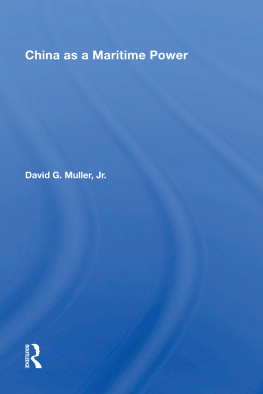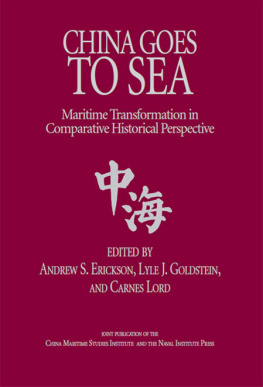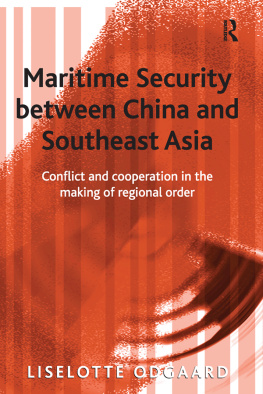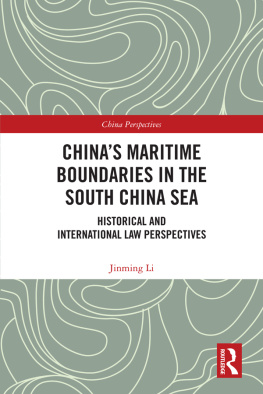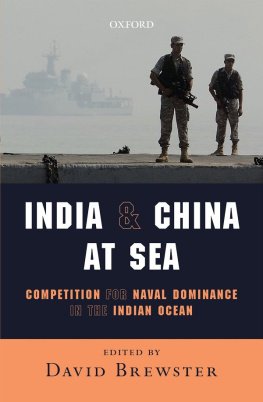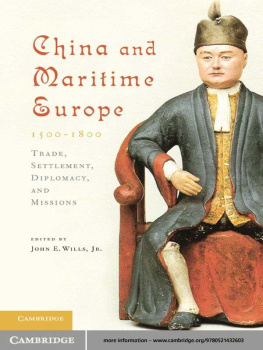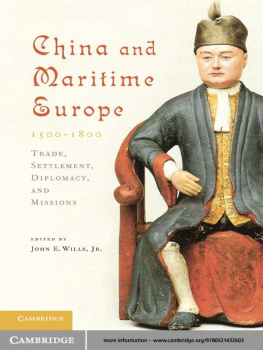China as a Maritime Power
Also of Interest
China Briefing, 1982, edited by Richard Bush
The Chinese Defense Establishment: Continuity and Change in the 1980s, edited by Paul H.B. Godwin
The Chinese Military System: An Organizational Study of the Chinese People's Liberation Army, Second, Revised Edition, Harvey W. Nelsen
China Among the Nations of the Pacific, edited by Harrison Brown
China in World Affairs: The Foreign Policy of the PRC Since 1970, G.W. Choudhury
China: A Political History, 1917-1980, Fully Revised and Updated Edition, Richard C. Thornton
Technology, Politics, and Science in China, Rudi Volti
From Muskets to Missiles: Politics and Professionalism in the Chinese Army, 1945-1981, Harlan W. Jencks
China, the Soviet Union, and the West: Strategic and Political Dimensions for the 1980s, edited by Douglas T. Stuart and William T. Tow
The China Quandary: Domestic Determinants of U.S.-China Policy, 1972-1982, Robert G. Sutter
China's Four Modernizations: The New Technological Revolution, edited by Richard Baum
Treaties of the People's Republic of China, 1949-1978: An Annotated Compilation, Grant F. Rhode and Reid E. Whitlock
Red Navy at Sea: Soviet Naval Operations on the High Seas, 1956-1980, Bruce W. Watson
Available in hardcover and paperback.
Westview Special Studies on East Asia
China as a Maritime Power
David G. Muller, Jr.
This is the first comprehensive study of the maritime aspects of China's national power. Drawing from extensive Chinese source materials and a large volume of recently declassified US. intelligence reports, Commander Muller looks at China's rise to strategic and economic power at sea since 1945.
For each of three major periods in modern Chinese history (1945 to the Sino-Soviet break, 1960 to the Lin Biao incident, and 1971 to the present), Commander Muller examines the evolution of Chinese maritime power from five perspectives: He recounts naval history in detail; analyzes naval strategy; reveals the key role of maritime economics; dissects internal navy politics; and addresses China's maritime foreign relations. A final chapter considers the implications of China's new status as a maritime power with regard to a possible Sino-Soviet war, the Taiwan issue, economic growth, and regional territorial conflict.
Lt.Cdr. Muller, currently assigned to the Office of Naval Intelligence in Washington, D.C., has been a career naval officer since 1970. He holds degrees in Asian and Chinese studies from Dartmouth College and the University of Michigan.
China as a Maritime Power
David G. Muller, Jr.
First published 1983 by Westview Press
Published 2018 by Routledge
52 Vanderbilt Avenue, New York, NY 10017
2 Park Square, Milton Park, Abingdon, Oxon OX14 4RN
Routledge is an imprint of the Taylor & Francis Group, an informa business
Copyright 1983 by Taylor & Francis
All rights reserved. No part of this book may be reprinted or reproduced or utilised in any form or by any electronic, mechanical, or other means, now known or hereafter invented, including photocopying and recording, or in any information storage or retrieval system, without permission in writing from the publishers.
Notice:
Product or corporate names may be trademarks or registered trademarks, and are used only for identification and explanation without intent to infringe.
Library of Congress Cataloging in Publication Data
Muller, David G., 1948-China
as a maritime power.
(Westview special studies on East Asia)
Bibliography: p.
Includes index.
1. ChinaHistory, Naval. I. Title. II. Series.
DS739.M84 1983 359'.00951 83-6767
ISBN 13: 978-0-367-01506-0 (hbk)
For Pamela
Contents
- Part 1
The End of World War II Through the Sino-Soviet Break - Part 2
The Sino-Soviet Split Through the Fall of Lin Biao - Part 3
Maritime China Since the Fall of Lin Biao
- Part 1
The End of World War II Through the Sino-Soviet Break - Part 2
The Sino-Soviet Split Through the Fall of Lin Biao - Part 3
Maritime China Since the Fall of Lin Biao
Guide
Professional naval officers are not known for their literary or academic prowess, and it was a unique confluence of events and influences that made it possible for me to attempt an undertaking such as China as a Maritime Power. My gratitude to a number of individuals is particularly heartfelt.
The impetus for the book itself came from my editor, Mervyn W. Adams Seldon, who first had the temerity to think that someone outside academia might be able to author an essentially academic work, and who then had to pay for her rashness by having to put up with my professional peregrinations from Pearl Harbor to the North Atlantic before I could get down to work on it. I suspect that my former schoolmate Jonathan Pollack, now at the RAND Corporation, may have had something to do with her persistence, and I thank him for that.
Special thanks are due to my parents, who made me aware of the world at an early age and who encouraged me in my chosen profession. Frederic Stone introduced me to Asia at Worcester Academy, and Jonathan Mirsky helped me to learn about China at Dartmouth College. Michel Oksenberg guided me through the thickets of Chinese political analysis at the University of Michigan and offered valuable counsel on a thesis that became the kernel of the present work. I would be remiss in not acknowledging my debt to the United States Navy. Without Navy assistance, I would never have had the opportunity to attend Dartmouth and Michigan. Lieutenant Commander (now Captain) Thomas A. Brooks played a key role at a crucial time, making much that followed possible.
I have drawn heavily upon concepts developed by two individuals. Robert W. Herrick's pioneering work Soviet Naval Strategy held the key to understanding much of China's naval development. The reader may note that I draw frequently upon Commander Herrick's formulation of the Young School in early Soviet naval thought. Allen Whiting's seminars at Michigan, plus his unique works on Chinese military strategy, underlie much of my interpretation of events in the maritime sphere. I most certainly bear sole responsibility for any misapplications of their perceptive and enlightening analyses.
Two individuals have been particularly generous with information and insights gathered over many years. Commander Bruce Swanson gave freely of materials accumulated in the course of researching his recently published landmark work on a millennium of Chinese naval history, Eighth Voyage of the Dragon: A History of China's Quest for Seapower. I am also indebted to Charles Dragonette, who I am convinced knows more about the Chinese merchant marine than anyone else outside the People's Republic of China (P.R.C.), for his invaluable help with the economics portions of the book.
Several more people merit a public word of thanks: Bernard Cavalcante of the U.S. Navy Historical Center, Ronald Sadowski of the Defense Intelligence Agency (DIA), Rita Fetzner and Patricia Bobbin of the DIA library, Major Daniel Jones, USMC, of the Navy Declassification Team, and Chief Draftsman's Mate Ronald J. Pesta.
Saving the most important until last, I thank my wife, Pamela, for her encouragement and help. Navy life allows little enough time together, but she gave up many hours of my dubious company so that I could work on the book, then made it readable when I was finished.


